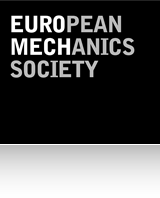661 – Rate effects in contact mechanics of soft solids: adhesion, friction, damping
Chairperson:
Antonio Papangelo
Department of Mechanics Mathematics and Management
Polytechnic University of Bari
Via Edoardo Orabona 4
70126 Bari
Italy
E-mail: antonio.papangelo AT poliba.it
Co-chairperson
Lars Pastewka
Faculty of Engineering
Department of Microsystems Engineering
University of Freiburg
Georges-Köhler-Allee 103
79104 Freiburg
Germany
Julien Scheibert
Research Director at CNRS
Experimental Tribology
Laboratoire de Tribologie et Dynamique des Systèmes
CNRS/École Centrale de Lyon/ENTPE
36 avenue Guy de Collongue
69130 Ecully
France
Soft viscoelastic materials are crucial for a wide range of everyday applications, including tire-road interactions, robotic grippers, precision manipulators, pressure-sensitive adhesives, vibration-damping supports, and energy-absorbing dampers. Elastomers, silicones, and rubbers exhibit complex time-dependent behaviour influencing interfacial adhesion, friction and damping characteristics. This peculiar behaviour poses both challenges and opportunities in material design, performance optimization, and predictive modelling. Understanding how the rate-dependent mechanical response of soft
materials influences adhesion, friction and damping is of fundamental importance for addressing contemporary technological challenges, enhancing energy efficiency, and reducing the overall carbon footprint associated with
human activities. The colloquium will specifically focus on soft contact mechanics with a particular emphasis on the following topics:
T1)Adhesion in soft contacts
T2)Frictional dissipation in viscoelastic materials
T3)Surface micro-patterning for influencing friction and adhesion
T4)Rate-dependent effects in viscoelastic adhesive materials
T5)Multiscale phenomena arising in soft, rough contacts
T6)Dynamical systems affected by contact nonlinearities
The colloquium will welcome both numerical and experimental contributions on rate-dependent phenomena in contact mechanics. Contributions addressing fundamental advancements in the physics of soft contacts, innovative applications, and novel methodological approaches are particularly encouraged. By fostering discussions on these topics, the colloquium aims to advance our understanding of soft material interactions and pave the way for new technological advancements in adhesion science and technology.
